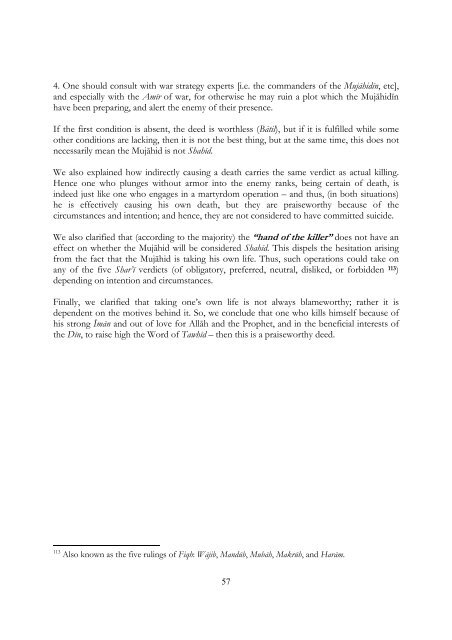the-islamic-ruling-on-the-permissibility-of-self-sacrificial-operations-suicide-or-martyrdom
the-islamic-ruling-on-the-permissibility-of-self-sacrificial-operations-suicide-or-martyrdom
the-islamic-ruling-on-the-permissibility-of-self-sacrificial-operations-suicide-or-martyrdom
Create successful ePaper yourself
Turn your PDF publications into a flip-book with our unique Google optimized e-Paper software.
4. One should c<strong>on</strong>sult with war strategy experts [i.e. <str<strong>on</strong>g>the</str<strong>on</strong>g> commanders <strong>of</strong> <str<strong>on</strong>g>the</str<strong>on</strong>g> Mujāhidīn, etc],<br />
and especially with <str<strong>on</strong>g>the</str<strong>on</strong>g> Amīr <strong>of</strong> war, f<strong>or</strong> o<str<strong>on</strong>g>the</str<strong>on</strong>g>rwise he may ruin a plot which <str<strong>on</strong>g>the</str<strong>on</strong>g> Mujāhidīn<br />
have been preparing, and alert <str<strong>on</strong>g>the</str<strong>on</strong>g> enemy <strong>of</strong> <str<strong>on</strong>g>the</str<strong>on</strong>g>ir presence.<br />
If <str<strong>on</strong>g>the</str<strong>on</strong>g> first c<strong>on</strong>diti<strong>on</strong> is absent, <str<strong>on</strong>g>the</str<strong>on</strong>g> deed is w<strong>or</strong>thless (Bātil), but if it is fulfilled while some<br />
o<str<strong>on</strong>g>the</str<strong>on</strong>g>r c<strong>on</strong>diti<strong>on</strong>s are lacking, <str<strong>on</strong>g>the</str<strong>on</strong>g>n it is not <str<strong>on</strong>g>the</str<strong>on</strong>g> best thing, but at <str<strong>on</strong>g>the</str<strong>on</strong>g> same time, this does not<br />
necessarily mean <str<strong>on</strong>g>the</str<strong>on</strong>g> Mujāhid is not Shahīd.<br />
We also explained how indirectly causing a death carries <str<strong>on</strong>g>the</str<strong>on</strong>g> same verdict as actual killing.<br />
Hence <strong>on</strong>e who plunges without arm<strong>or</strong> into <str<strong>on</strong>g>the</str<strong>on</strong>g> enemy ranks, being certain <strong>of</strong> death, is<br />
indeed just like <strong>on</strong>e who engages in a <strong>martyrdom</strong> operati<strong>on</strong> – and thus, (in both situati<strong>on</strong>s)<br />
he is effectively causing his own death, but <str<strong>on</strong>g>the</str<strong>on</strong>g>y are praisew<strong>or</strong>thy because <strong>of</strong> <str<strong>on</strong>g>the</str<strong>on</strong>g><br />
circumstances and intenti<strong>on</strong>; and hence, <str<strong>on</strong>g>the</str<strong>on</strong>g>y are not c<strong>on</strong>sidered to have committed <strong>suicide</strong>.<br />
We also clarified that (acc<strong>or</strong>ding to <str<strong>on</strong>g>the</str<strong>on</strong>g> maj<strong>or</strong>ity) <str<strong>on</strong>g>the</str<strong>on</strong>g> “hand <strong>of</strong> <str<strong>on</strong>g>the</str<strong>on</strong>g> killer” does not have an<br />
effect <strong>on</strong> whe<str<strong>on</strong>g>the</str<strong>on</strong>g>r <str<strong>on</strong>g>the</str<strong>on</strong>g> Mujāhid will be c<strong>on</strong>sidered Shahīd. This dispels <str<strong>on</strong>g>the</str<strong>on</strong>g> hesitati<strong>on</strong> arising<br />
from <str<strong>on</strong>g>the</str<strong>on</strong>g> fact that <str<strong>on</strong>g>the</str<strong>on</strong>g> Mujāhid is taking his own life. Thus, such operati<strong>on</strong>s could take <strong>on</strong><br />
any <strong>of</strong> <str<strong>on</strong>g>the</str<strong>on</strong>g> five Shar’ī verdicts (<strong>of</strong> obligat<strong>or</strong>y, preferred, neutral, disliked, <strong>or</strong> f<strong>or</strong>bidden 113 )<br />
depending <strong>on</strong> intenti<strong>on</strong> and circumstances.<br />
Finally, we clarified that taking <strong>on</strong>e’s own life is not always blamew<strong>or</strong>thy; ra<str<strong>on</strong>g>the</str<strong>on</strong>g>r it is<br />
dependent <strong>on</strong> <str<strong>on</strong>g>the</str<strong>on</strong>g> motives behind it. So, we c<strong>on</strong>clude that <strong>on</strong>e who kills him<strong>self</strong> because <strong>of</strong><br />
his str<strong>on</strong>g Īmān and out <strong>of</strong> love f<strong>or</strong> Allāh and <str<strong>on</strong>g>the</str<strong>on</strong>g> Prophet, and in <str<strong>on</strong>g>the</str<strong>on</strong>g> beneficial interests <strong>of</strong><br />
<str<strong>on</strong>g>the</str<strong>on</strong>g> Dīn, to raise high <str<strong>on</strong>g>the</str<strong>on</strong>g> W<strong>or</strong>d <strong>of</strong> Tawhīd – <str<strong>on</strong>g>the</str<strong>on</strong>g>n this is a praisew<strong>or</strong>thy deed.<br />
113<br />
Also known as <str<strong>on</strong>g>the</str<strong>on</strong>g> five <str<strong>on</strong>g>ruling</str<strong>on</strong>g>s <strong>of</strong> Fiqh: Wājib, Mandūb, Mubāh, Makrūh, and Harām.<br />
57


